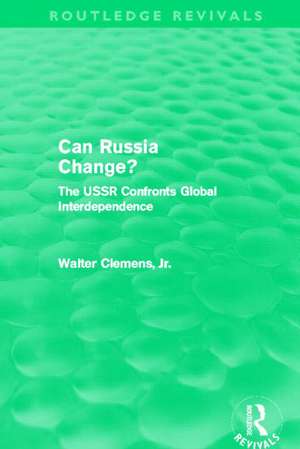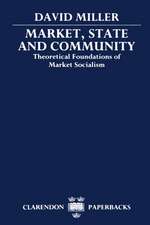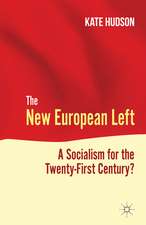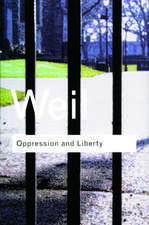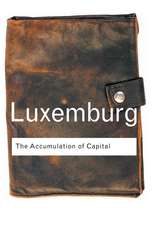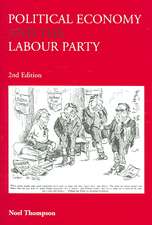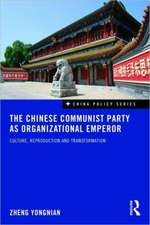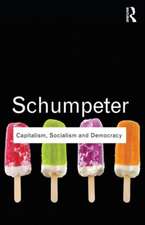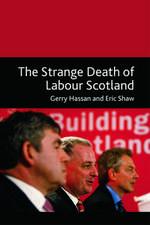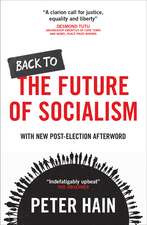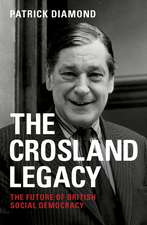Can Russia Change? (Routledge Revivals): The USSR confronts Global Interdependence: Routledge Revivals
Autor Walter Clemensen Limba Engleză Hardback – 31 oct 2011
In order to answer this question, the author compares advances and setbacks in arms control and security affairs with co-operation on less politically salient issues such as environmental degradation. He finds that in the nearly seventy years preceding Mikhail Gorbachev’s rise to power, the Kremlin relied on several basic approaches to foreign relations. These policies isolated the Soviet Union from those nations whose co-operation it needed to cope with the escalating interdependencies of the time. Gorbachev, Clemens argues, was the first Soviet leader to recognise both the problems and potential benefits of global interdependence and to explore the possibilities for co-operation between East and West to advance mutual security.
Can Russia Change? is unique in its comparative approach and historical perspective, and this reissue will prove invaluable to all those interested in the history of Soviet security and foreign policy, as well as US-Soviet relations.
| Toate formatele și edițiile | Preț | Express |
|---|---|---|
| Paperback (1) | 416.22 lei 6-8 săpt. | |
| Taylor & Francis – 12 feb 2013 | 416.22 lei 6-8 săpt. | |
| Hardback (1) | 992.43 lei 6-8 săpt. | |
| Taylor & Francis – 31 oct 2011 | 992.43 lei 6-8 săpt. |
Din seria Routledge Revivals
- 9%
 Preț: 801.69 lei
Preț: 801.69 lei - 8%
 Preț: 432.15 lei
Preț: 432.15 lei -
 Preț: 153.81 lei
Preț: 153.81 lei -
 Preț: 230.80 lei
Preț: 230.80 lei -
 Preț: 294.72 lei
Preț: 294.72 lei -
 Preț: 258.72 lei
Preț: 258.72 lei - 9%
 Preț: 764.34 lei
Preț: 764.34 lei - 9%
 Preț: 903.41 lei
Preț: 903.41 lei -
 Preț: 296.10 lei
Preț: 296.10 lei -
 Preț: 342.36 lei
Preț: 342.36 lei - 9%
 Preț: 606.35 lei
Preț: 606.35 lei -
 Preț: 317.54 lei
Preț: 317.54 lei - 9%
 Preț: 764.28 lei
Preț: 764.28 lei -
 Preț: 257.00 lei
Preț: 257.00 lei -
 Preț: 238.40 lei
Preț: 238.40 lei -
 Preț: 259.47 lei
Preț: 259.47 lei - 9%
 Preț: 903.80 lei
Preț: 903.80 lei -
 Preț: 326.26 lei
Preț: 326.26 lei -
 Preț: 258.66 lei
Preț: 258.66 lei -
 Preț: 294.97 lei
Preț: 294.97 lei -
 Preț: 308.89 lei
Preț: 308.89 lei -
 Preț: 199.85 lei
Preț: 199.85 lei -
 Preț: 347.49 lei
Preț: 347.49 lei -
 Preț: 295.04 lei
Preț: 295.04 lei -
 Preț: 389.39 lei
Preț: 389.39 lei -
 Preț: 257.00 lei
Preț: 257.00 lei -
 Preț: 343.21 lei
Preț: 343.21 lei - 9%
 Preț: 640.90 lei
Preț: 640.90 lei - 9%
 Preț: 619.48 lei
Preț: 619.48 lei -
 Preț: 228.88 lei
Preț: 228.88 lei -
 Preț: 257.67 lei
Preț: 257.67 lei -
 Preț: 245.10 lei
Preț: 245.10 lei -
 Preț: 258.52 lei
Preț: 258.52 lei -
 Preț: 258.72 lei
Preț: 258.72 lei -
 Preț: 368.93 lei
Preț: 368.93 lei -
 Preț: 246.37 lei
Preț: 246.37 lei - 9%
 Preț: 832.07 lei
Preț: 832.07 lei -
 Preț: 258.66 lei
Preț: 258.66 lei -
 Preț: 286.98 lei
Preț: 286.98 lei - 18%
 Preț: 695.85 lei
Preț: 695.85 lei - 9%
 Preț: 934.94 lei
Preț: 934.94 lei - 5%
 Preț: 231.22 lei
Preț: 231.22 lei -
 Preț: 267.15 lei
Preț: 267.15 lei -
 Preț: 200.66 lei
Preț: 200.66 lei - 9%
 Preț: 638.61 lei
Preț: 638.61 lei -
 Preț: 259.68 lei
Preț: 259.68 lei - 9%
 Preț: 1038.45 lei
Preț: 1038.45 lei -
 Preț: 389.43 lei
Preț: 389.43 lei -
 Preț: 302.13 lei
Preț: 302.13 lei -
 Preț: 294.72 lei
Preț: 294.72 lei
Preț: 992.43 lei
Preț vechi: 1332.08 lei
-25% Nou
Puncte Express: 1489
Preț estimativ în valută:
189.90€ • 198.27$ • 157.17£
189.90€ • 198.27$ • 157.17£
Carte tipărită la comandă
Livrare economică 04-18 aprilie
Preluare comenzi: 021 569.72.76
Specificații
ISBN-13: 9780415500616
ISBN-10: 0415500613
Pagini: 414
Dimensiuni: 156 x 234 x 28 mm
Greutate: 0.76 kg
Ediția:1
Editura: Taylor & Francis
Colecția Routledge
Seria Routledge Revivals
Locul publicării:Oxford, United Kingdom
ISBN-10: 0415500613
Pagini: 414
Dimensiuni: 156 x 234 x 28 mm
Greutate: 0.76 kg
Ediția:1
Editura: Taylor & Francis
Colecția Routledge
Seria Routledge Revivals
Locul publicării:Oxford, United Kingdom
Cuprins
Part 1: Gorbachev’s Inheritance: Burden’s of the Past 1. The Need for Change: What has the Kremlin Achieved in Foreign Policy since 1917 2. Models for Change: Alternative Approaches, 1917-85 Part 2: Pressures for Change, 1917-85 3. Driving Forces in the Soviet Crucible: Arms Control Imperatives 4. Arms Control Imperatives in the Social Arena 5. The Third Rome Confronts the Club of Rome: "Globalistika" 6. "Life Itself" versus the Party Line on Global Issues Part 3: Gorbachev’s New Thinking : Security with Interdependence 7. A Revolution in Soviet Ideology: Speaking the Unthinkable 8. Actions Louder than Words: Doing the Unthinkable 9. What Makes Arms Accords Possible? Necessary and Helpful Conditions 10. Can the Kremlin be Trusted? Can Washington? Part 4. Creating the Future 11. Alterrnative Futures: Détente, Confrontation, Transformation? 12. Managing Soviet-US Relations: Challenges and Choices
Descriere
First published in 1990, this ground-breaking book sought to determine whether contemporary Russia had the capacity to change and if, in so doing, it could alter the complex web of East-West relations from a zero-sum struggle to a state of peaceful competition and mutual security.
